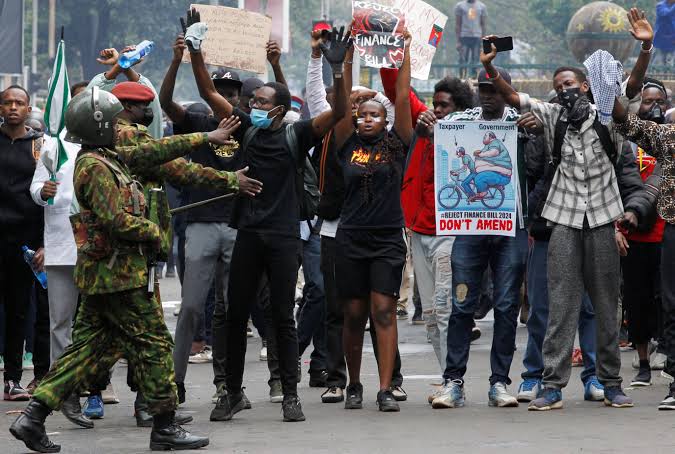
Kenya’s Finance Bill: Why Has It Triggered Protests?.


Youth-led protests against the Kenyan government’s plans to raise revenue through additional taxes have intensified as lawmakers vote on proposed amendments to the bill.
At least two people have been killed and more than 200 injured since protests against the finance bill swept the country earlier this month. Here are some details about the tax proposals:
Why the Finance Bill?
A finance bill is usually presented to parliament before the start of a financial year that runs from July to June, laying out the government’s fiscal plans. In the 2024/25 bill, the Kenyan government aims to raise $2.7 billion in additional taxes to reduce the budget deficit and state borrowing. Kenya’s public debt stands at 68% of GDP, higher than the 55% of GDP recommended by the World Bank and the International Monetary Fund.
Grappling with acute liquidity challenges amid uncertainty over its ability to access capital from financial markets, Kenya has turned to the IMF, which has urged the government to meet revenue targets to access more funding.
Protesters want the government to abandon the planned tax hikes, which they argue will choke the economy and raise the cost of living for Kenyans who are already struggling to make ends meet. This is not the first time a finance bill has met with resistance from some citizens. The government of President William Ruto, who was elected in 2022 on a pledge to uplift the lives of the poor, last year used the bill to introduce a housing tax and to raise the top personal income tax rate, sparking anger, street protests, and court challenges.
What Are the Proposed Tax Measures?
The proposed measures that have triggered protests include new levies on basic commodities like bread, vegetable oil, and sugar, and a new motor vehicle circulation tax, pegged at 2.5% of the value of a car to be paid annually. An “eco levy” on most manufactured goods, including sanitary towels and diapers, is also on the cards. In addition to the new taxes, the bill proposes increasing existing taxes on financial transactions.
The government has said the tax measures are necessary to fund development programs and cut public debt. Last week the government softened its position a little, with Ruto endorsing recommendations to scrap some of the new levies, including on car ownership, bread, and the eco levy on locally manufactured goods. The finance ministry has said such concessions would blow a 200 billion Kenyan shilling ($1.56 billion) hole in the 2024/25 budget and necessitate spending cuts. Protesters and opposition parties have said the concessions are not enough and want the whole bill abandoned.
What’s Next for the Bill?
Parliament will meet on Tuesday to vote on the proposed amendments to the bill. Members of parliament will not discuss areas of the bill that are not subject to amendments. Once passed by parliament, President Ruto would have to sign it into law within 14 days or send it back to parliament for further amendments.
What About the Protests?
Ruto has acknowledged the youth-led protests and pledged to hold dialogue to address their concerns. It is unclear when this will happen. It is also unclear whether the protests will intensify should parliament pass the bill. The social media-driven protests lack clear leadership structures, but many young people have pledged to keep demonstrating. Some protesters have cited the arrest of at least two activists since Ruto’s offer of talks on Sunday as evidence the government does not have any goodwill. The government has said the withdrawal of some tax proposals shows its willingness to compromise.
($1 = 128.0000 Kenyan shillings)
Article By Suzy Nyongesa.
